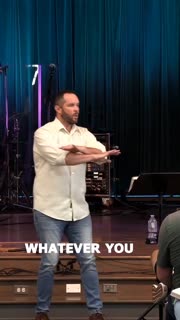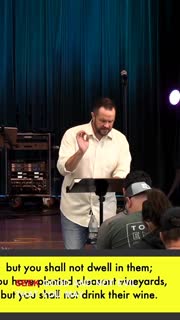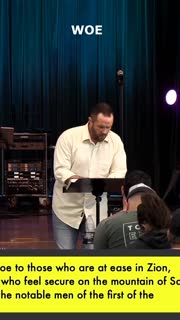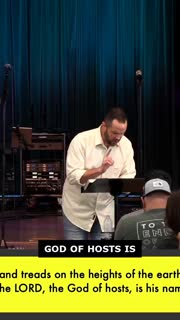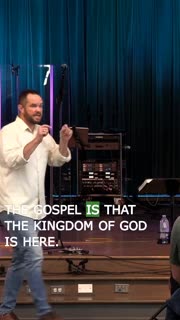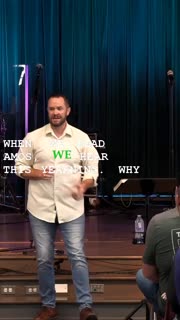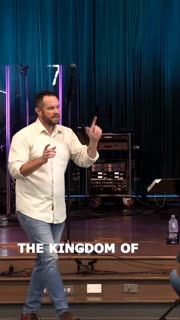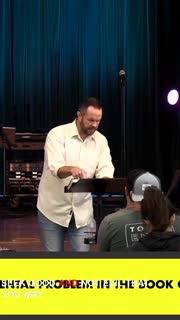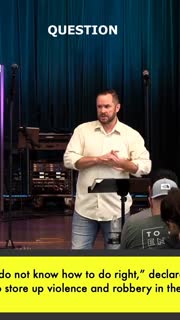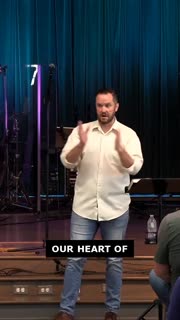Amos: A Call to Justice and Restoration
Devotional
Sermon Summary
Bible Study Guide
Sermon Clips
1. "Whatever you walked away with, that was good, because when we learn, we learn by what we call. It's spaced repetition. That is, you encounter something, and whatever you encounter it, it may be unknown. You may not know what it is, but the next time you encounter it, it's a little more clear. You didn't know it existed. Now you know it exists. And then the next time, you didn't know that this person was in the Old Testament. Now you know they're in the Old Testament. Every time we encounter it, you're growing a little bit." [05:10] (26 seconds)
2. "Seek good and not evil, that you may live, so the God of hosts will be with you, as you have said. Hate evil and love good. Establish justice in the gate, that it may be the Lord, the God of hosts, will be gracious to the remnant of Joseph. So he's saying, listen, we've got to seek good. We've got to hate evil." [22:07] (21 seconds)
3. "Woe to those who are at ease in Zion. Woe to those who are at ease in Zion and feel secure on the mountain of Samaria, the notable men of the first nations to whom the house of Israel comes. Zion is, that's where Jerusalem is. That's where the temple would be. And for us, it would be like him saying, hey, woe to you who are in church and you're sitting back as if it didn't God good to us. It didn't God good to us. Hey, we're in the house of the Lord. We're comfortable. Woe, woe to you who are in Zion. Woe to you who are in church and think you're comfortable." [23:03] (35 seconds)
4. "The Lord, the God of hosts is his name. Verse five or chapter five verse four says this. Thus says the Lord to the house of Israel, seek me and live. If you want to know what Amos is yelling at us, he is yelling to us. The Lord decides. Remember that vision that he had of a. Plum line says in Amos seven. This is the vision he showed me. Behold, the Lord was standing beside a wall with a plum line. And he said, I said, Amos, what do you see? Amos said, I see a plum line. And the Lord said, behold, I'm setting a plum line in the midst of the people of Israel. I will never pass by them again." [36:09] (39 seconds)
5. "The gospel is that the kingdom of God is here. That is what the gospel is. And it's everything to do with the kingdom of God. It is every single thing about the kingdom of God. It is not just how do you get into the kingdom of God? Oh, I receive by repenting and believing. Yes, you get into the kingdom. That's how you take your first step. But then you don't just stop there. You're in the kingdom of God. The Holy Spirit is alive and active." [45:16] (26 seconds)
6. "When we read Amos, we hear this yearning. Why isn't life better? Why isn't, you know, I'm in Israel, but why aren't the people acting like it? Why don't I see justice? Why don't I see it? And Amos is yelling and this yearning you have is the gospel. There's a kingdom that God is forming. There is a kingdom that only he can do. But when God empowers this kingdom, you and I are part of it. And it doesn't stop with us buying a ticket and getting in. We become active in it." [46:51] (31 seconds)
7. "The kingdom of God is so much better. When we read Amos, we hear this yearning. Why isn't life better? Why isn't, you know, I'm in Israel, but why aren't the people acting like it? Why don't I see justice? Why don't I see it? And Amos is yelling and this yearning you have is the gospel. There's a kingdom that God is forming. There is a kingdom that only he can do. But when God empowers this kingdom, you and I are part of it. And it doesn't stop with us buying a ticket and getting in. We become active in it." [46:51] (34 seconds)
8. "Seek good and not evil, that you may live, so the Lord, the God of hosts will be with you. Hate evil and love good. Establish justice at the gate so that God will be gracious to you, the remnant of Joseph. Seek good. That's what God wants you to know out of this. But what do you do when your definition of good is not God's definition of good? What do you do when your definition of evil is not God's definition of evil?" [27:41] (31 seconds)
9. "The first question and the main question I want us to wrestle with with Amos is how do you know right from wrong? How? Who decides for you? Who decides for us? What is right and what is wrong? What is good and what is evil? Now? We're to ask some people, hopefully not in this group, but maybe some of us who decides on certain issues. Well, the government decides. Some of us would say the government decides important issues. Is abortion right or wrong? Well, you know, we let the states decide. That's how we settle that. Okay, we let the states decide." [28:41] (34 seconds)
10. "The truth is our heart of this nation has just turned away from God. That's not going to be in this. Okay. That's not going to be in any of these debates. I don't think you're going to hear that. And, and that's the, that's basically what Amos is saying. Is listen, y'all are judging good. And we're trying to argue our government is doing good because our economy is good or because it's the way it's going. But the truth is our hearts have to be focused on God." [30:20] (23 seconds)
Ask a question about this sermon
2. "Seek good and not evil, that you may live, so the God of hosts will be with you, as you have said. Hate evil and love good. Establish justice in the gate, that it may be the Lord, the God of hosts, will be gracious to the remnant of Joseph. So he's saying, listen, we've got to seek good. We've got to hate evil." [22:07] (21 seconds)
3. "Woe to those who are at ease in Zion. Woe to those who are at ease in Zion and feel secure on the mountain of Samaria, the notable men of the first nations to whom the house of Israel comes. Zion is, that's where Jerusalem is. That's where the temple would be. And for us, it would be like him saying, hey, woe to you who are in church and you're sitting back as if it didn't God good to us. It didn't God good to us. Hey, we're in the house of the Lord. We're comfortable. Woe, woe to you who are in Zion. Woe to you who are in church and think you're comfortable." [23:03] (35 seconds)
4. "The Lord, the God of hosts is his name. Verse five or chapter five verse four says this. Thus says the Lord to the house of Israel, seek me and live. If you want to know what Amos is yelling at us, he is yelling to us. The Lord decides. Remember that vision that he had of a. Plum line says in Amos seven. This is the vision he showed me. Behold, the Lord was standing beside a wall with a plum line. And he said, I said, Amos, what do you see? Amos said, I see a plum line. And the Lord said, behold, I'm setting a plum line in the midst of the people of Israel. I will never pass by them again." [36:09] (39 seconds)
5. "The gospel is that the kingdom of God is here. That is what the gospel is. And it's everything to do with the kingdom of God. It is every single thing about the kingdom of God. It is not just how do you get into the kingdom of God? Oh, I receive by repenting and believing. Yes, you get into the kingdom. That's how you take your first step. But then you don't just stop there. You're in the kingdom of God. The Holy Spirit is alive and active." [45:16] (26 seconds)
6. "When we read Amos, we hear this yearning. Why isn't life better? Why isn't, you know, I'm in Israel, but why aren't the people acting like it? Why don't I see justice? Why don't I see it? And Amos is yelling and this yearning you have is the gospel. There's a kingdom that God is forming. There is a kingdom that only he can do. But when God empowers this kingdom, you and I are part of it. And it doesn't stop with us buying a ticket and getting in. We become active in it." [46:51] (31 seconds)
7. "The kingdom of God is so much better. When we read Amos, we hear this yearning. Why isn't life better? Why isn't, you know, I'm in Israel, but why aren't the people acting like it? Why don't I see justice? Why don't I see it? And Amos is yelling and this yearning you have is the gospel. There's a kingdom that God is forming. There is a kingdom that only he can do. But when God empowers this kingdom, you and I are part of it. And it doesn't stop with us buying a ticket and getting in. We become active in it." [46:51] (34 seconds)
8. "Seek good and not evil, that you may live, so the Lord, the God of hosts will be with you. Hate evil and love good. Establish justice at the gate so that God will be gracious to you, the remnant of Joseph. Seek good. That's what God wants you to know out of this. But what do you do when your definition of good is not God's definition of good? What do you do when your definition of evil is not God's definition of evil?" [27:41] (31 seconds)
9. "The first question and the main question I want us to wrestle with with Amos is how do you know right from wrong? How? Who decides for you? Who decides for us? What is right and what is wrong? What is good and what is evil? Now? We're to ask some people, hopefully not in this group, but maybe some of us who decides on certain issues. Well, the government decides. Some of us would say the government decides important issues. Is abortion right or wrong? Well, you know, we let the states decide. That's how we settle that. Okay, we let the states decide." [28:41] (34 seconds)
10. "The truth is our heart of this nation has just turned away from God. That's not going to be in this. Okay. That's not going to be in any of these debates. I don't think you're going to hear that. And, and that's the, that's basically what Amos is saying. Is listen, y'all are judging good. And we're trying to argue our government is doing good because our economy is good or because it's the way it's going. But the truth is our hearts have to be focused on God." [30:20] (23 seconds)
